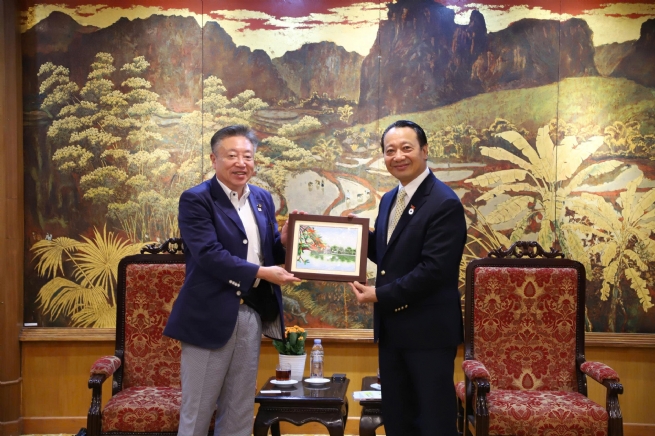Vietnam-Japan Business Cooperation Strengthened
A delegation from the Liberal Democratic Party of the Toyota City Council, Aichi Prefecture, Japan, led by Councilor Suzuki Akira, met with Nguyen Quang Vinh, Vice President of the Vietnam Chamber of Commerce and Industry (VCCI), to discuss prospects for cooperation in economics, high technology, and sustainable development.

VCCI Vice President Nguyen Quang Vinh (R) and Councilor Suzuki Akira of Toyota City Council, Aichi Prefecture
During their visit to Vietnam, the Japanese delegates expressed admiration for the country’s rapid economic growth and remarkable transformation in urban infrastructure and airport systems compared with 15 years ago. Suzuki appreciated the role of Vietnamese workers employed in businesses linked to Toyota, calling them a key factor in shared development. He also said that Toyota City, home to the Toyota Motor Corporation headquarters, has strong potential to become a strategic hub for expanded cooperation between the two sides.
VCCI Vice President Nguyen Quang Vinh emphasized that Vietnam greatly values Japan’s business management experience and corporate culture, especially the globally recognized model of “The Knowledge-Creating Company.” He regarded this as an important source of knowledge for Vietnamese enterprises to strengthen competitiveness and deepen participation in global value chains.
He underscored Vietnam’s interest in adopting advanced technologies, modern management practices, and high-quality investment capital from Japan. Potential areas for cooperation include digital transformation, the circular economy, artificial intelligence, semiconductor component production, and green transition, which offer strong complementarities between the two economies. Moreover, Vietnam’s plans to establish international financial centers in Ho Chi Minh City and Da Nang open up new opportunities for financial collaboration.
Sustainable development and environmental protection have become key priorities for the business community. He highlighted Japan’s expertise in clean energy and waste treatment as valuable experience and expressed the hope that enterprises from both countries would strengthen cooperation to promote green growth models.
Vietnam’s government has pledged to achieve net-zero emissions by 2050, as declared at COP26, focusing on renewable energy sources such as wind, solar, and ocean wave power, while also studying the long-term potential of nuclear energy. The government is expediting administrative reforms and making major investments in infrastructure, including expressways, airports, and high-speed rail, to ensure balanced regional development and ease population and economic concentration in major cities.
Suzuki said that Vietnam offers strong conditions for sustained growth, from its stable political environment and government reform efforts to its diligent, creative, and adaptable workforce. In agriculture, Vietnam, once among the world’s top rice exporters, is rapidly moving toward high-tech, low-emission production, opening new opportunities for cooperation with Japan in producing high-quality agricultural products that meet strict international standards.
The visit by the Toyota City delegation marked an opportunity for both sides to define new directions in an era of high technology and sustainable growth. With mutual goodwill and shared determination, Vietnam-Japan relations are expected to continue expanding and strengthening across all dimensions in the coming years.








